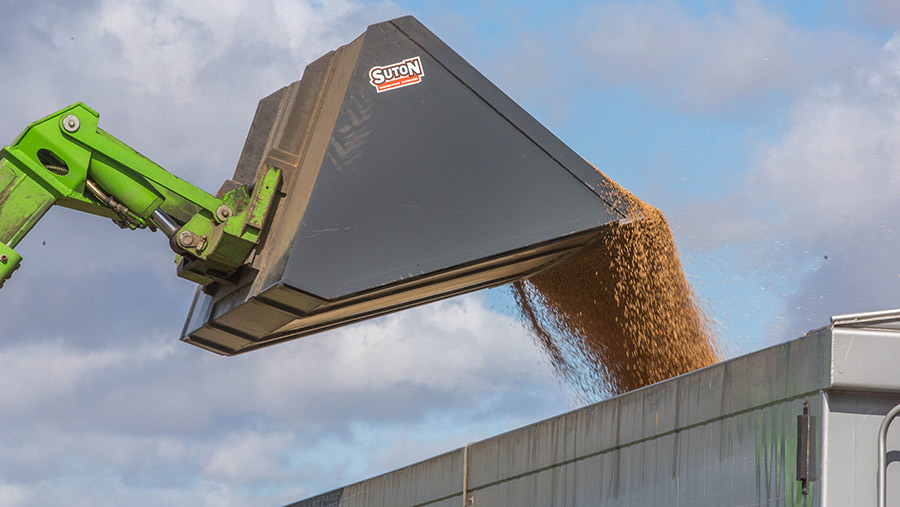Crop buyers’ contract terms farmers should be vigilant about
 © Tim Scrivener
© Tim Scrivener Growers should check the annual terms of trade issued by buyers to make sure they are aware of all requirements and restrictions, say advisers.
These terms apply for each crop year starting on 1 July and are used in conjunction with the Agricultural Industries Confederation’s AIC Grain/Pulses No.1/21 grain and pulses contract but override the AIC document in certain areas and add terms in many cases.
The same applies for oilseed rape and linseed, which are generally bought ex-farm under the Federation of Oils, Seeds and Fats Associations (Fosfa) 26A and 9A contract respectively.
See also: How to save time stress and cash on farm office routines
The buyers’ own terms vary and are likely to deviate from or add to the AIC and Fosfa contracts placing obligations on growers. They include the following:
Food Safety Act
Most buyers’ terms incorporate a duty for sellers to acknowledge and recognise their obligations under the Food Safety Act 1990 and any subsequent food safety legislation, and to confirm that what they supply will conform.
Some buyers make specific mention of the need to comply with the Trade Assurance Scheme for Combinable Crops (TASCC) and related documents.
Tolerances
Under the AIC Grain/Pulses No.1/21 contract, the seller has the option to deliver 5% or 15t (whichever is the lesser) more than the contract tonnage.
However, some buyers’ terms state that this will be at the buyers’ option.
The same applies regarding oilseed rape and linseed.
Glyphosate
Glyphosate is currently permitted for use in malting barley production, including as a pre-harvest desiccant.
Check whether buyers’ terms require growers to inform them if glyphosate has been used in this way on malting barley crops, as some maltsters strongly discourage it.
Biostimulants
While plant-based biostimulant products are widely accepted, the precautionary principle means that for several years the treatment of crops for food use with biostimulants derived from animal material has not been accepted by buyers.
Specific mention is made of this in buyers’ terms of trade, although this differs between companies.
Some merchants require notification in writing before the sale of crops that have been treated with animal-derived biostimulants and some ban their use on crops destined for feed use, too.
Such products are not regulated in their application, so it is not a legal issue, points out Jo Gilbertson, chairman of AIC’s contracts committee.
“Biostimulants, per se, are a good thing,” he says. “The mineral ones have a long track record. The concerns stem from retailers and food processors.”
However, he expects the use of biostimulant products to become regulated in future, as they are in the EU.
Sewage sludge
While it has long been a requirement that sewage sludge is not applied to land used to grow barley for malting or distilling, there is also specific mention of an exclusion for oats in some merchants’ terms of trade.
Many use a cover-all term requiring sellers to notify in advance of, or at the time of, sale if sewage sludge has been applied on the land and some cover this with “at any time”.
Horse feed market
There is a growing list of naturally occurring prohibited substances (Nops) relating to the supply of crops for horse feed.
This is referred to in buyers’ terms, obligating the seller to comply or at least inform the buyer if they suspect they have a problem complying with this.
Nops is a voluntary code of practice developed by the British Equestrian Trade Association to reduce the risk of disqualification by racing authorities if traces of certain substances are detected at testing.
Diatomaceous earth/dusts
Some customers have prohibited the use of these products, although they are legal, and buyers’ terms of trade generally request that they are not used.
If they are used, some request that growers inform them of this as it can limit the potential homes for crops.
Check – and ask the question
Hutchinsons’ technical manager, Dick Neale, says growers should check their buyers’ terms for any restrictions and ask questions directly if anything is unclear.
Some millers restrict the application of certain products after a certain growth stage, he points out.
Also, former potato stores where CIPC sprout suppressants were applied are largely unusable for grain storage as the fabric of the building is contaminated with the product, usually in the insulation.
